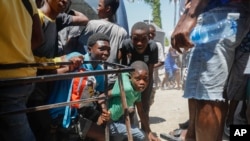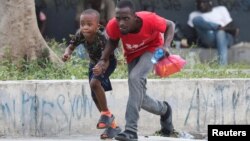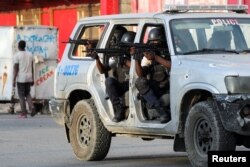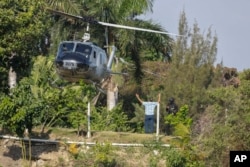As Haiti's transitional government struggles to take shape, the island nation's powerful gangs have continued to make advances in the capital, Port-au-Prince, residents of the capital reported on Saturday.
Armed criminals attacked the bases of two specialized police units in the capital area, residents told Agence France-Presse by phone. There were no details about casualties.
As street violence continues, hunger worsens, United Nations officials said.
"There is a very, very great fatigue. There is human suffering on an alarming scale. A lot of fear. Trauma. People are just simply tired," Ulrika Richardson, the U.N. resident and humanitarian coordinator for Haiti, told reporters Thursday in a video call from Port-au-Prince.
In the first two months of this year, 2,500 people were killed, kidnapped or injured in the violence, Richardson said.
In addition, almost half of Haiti's people are struggling to feed themselves, international organizations said Friday, with some areas approaching famine.
Haiti is now facing its worst food insecurity levels on record, according to the World Food Program.
"Rising hunger is fueling the security crisis that is shattering the country. We need urgent action now — waiting to respond at scale is not an option," said Jean-Martin Bauer, the World Food Program's Haiti director.
Meanwhile, more than 33,000 people have fled Port-au-Prince this month alone, the U.N. said late Thursday, as the capital has seen roadblocks and widespread violence grow.
Gang "attacks and generalized insecurity are pushing more and more people to leave the capital to find refuge in provinces, taking the risks of passing through gangs-controlled routes," the U.N.'s International Organization for Migration said in a statement late Thursday.
It "should be emphasized that provinces do not have sufficient infrastructures and host communities do not have sufficient resources that can enable them to cope with these massive displacement flows coming from the capital," the statement continued.
Years of instability
Haiti has been rocked by instability since 2021, when President Jovenel Moise was assassinated. Prime Minister Ariel Henry then led the country until he announced his resignation this month. He said he will formally leave office when a transitional government is in place. Haiti has not held elections since 2016.
The transitional council that is still in the process of being organized would name an interim prime minister to oversee a national vote. However, gangs have already indicated that they will not recognize the coalition government, according to the International Crisis Group.
White House spokesperson John Kirby said Friday the Biden administration hopes to see progress with the transitional government in the coming days.
Police are facing difficulties as armed groups in recent days "advanced into new areas of the capital," the U.N.'s Richardson said Thursday. "We see people coming in with gunshot wounds from many areas around Port-au-Prince."
The U.N. Security Council called on countries to enforce an existing arms embargo on Haiti, citing "grave concern at the illicit flow of arms and ammunition into Haiti that remains a fundamental factor of instability and violence."
Meanwhile, humanitarians are struggling to provide much-needed aid to Haiti's 5.5 million people. The World Health Organization said the closure of Port-au-Prince's airport has made importing essential goods and medicine impossible.
"The national port is operational, but accessing it is challenging, as the surrounding areas are controlled by gangs," the group's director-general, Tedros Adhanom Ghebreyesus, said.
Only 5% of Haitians have received humanitarian aid, according to a report by the Integrated Food Security Phase Classification.
Foreigners leave
Rising threats in the country mean foreigners have been leaving Haiti entirely. As of Saturday, the U.S. State Department has helped more than 230 U.S. citizens leave Haiti since Sunday, a State Department spokesperson told VOA.
"We will continue to monitor demand from U.S. citizens for assistance in departing Haiti on a real-time basis," the spokesperson said in a statement.
"We reiterate our message to U.S. citizens: Do not travel to Haiti," they added, citing ongoing instability.
VOA's U.N. Correspondent Margaret Besheer and State Department Bureau Chief Nike Ching contributed to this report. Some information in this report came from Reuters and Agence France-Presse.








